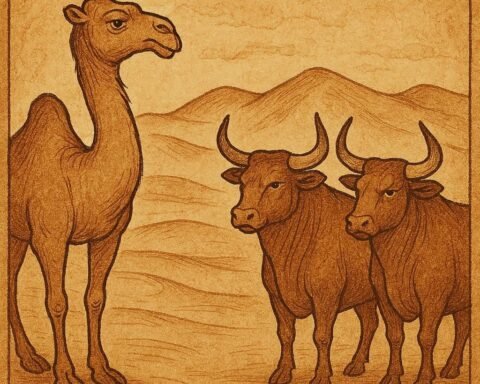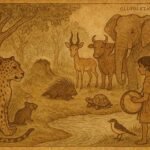Long ago in Somalia, there lived a man named Egal Sheeda, a trickster whose wit and cunning were both admired and feared. One day, his bull wandered into the field of a neighbor and devoured the man’s crops. The neighbor, furious at the loss of his harvest, came storming to Egal Sheeda’s home to protest. Egal Sheeda, with his usual calm smile, promised that it would not happen again. Yet, the very next day, the bull once more strayed into the same field, trampling and eating as it pleased.
The neighbor returned, his anger doubled. “Egal Sheeda,” he shouted, “you swore your bull would not touch my crops again, and yet today it has destroyed them a second time!”
Egal Sheeda spread his hands in mock helplessness. “As you see, I cannot control this bull. The only solution is for you to slaughter it.”
The neighbor, eager to be rid of the trouble, agreed. They killed the bull and divided its meat, bringing a large portion to Egal Sheeda. With sly calculation, he carried the meat to the market, where he sold it all for a fine price. Returning home with a pouch full of money, he boasted to the villagers, “I sold the beef from my bull today and earned great wealth.”
READ THIS: Degder and the Five Sisters: A Somali Folktale that Teaches Forgiveness
The neighbors, astonished and greedy, whispered among themselves. “If Egal Sheeda gained wealth by selling beef, why should we not do the same? Let us slaughter our bulls and take the meat to market.”
So, one by one, they killed their bulls and hurried to sell the beef. But fortune did not favor them. The market overflowed with meat, and no buyers came. They returned home in despair, realizing they had been tricked.
“Egal Sheeda has deceived us,” they muttered. “We must punish him.”
In their rage, they seized him, bound him inside a sack, and dragged him to the riverbank. “We will throw him into the water so he may trouble us no more,” they declared. Yet before they could complete their plan, the call to prayer sounded. As faithful men, they left the sack on the river’s edge and went away to pray.
At that very moment, a farmer passed by, curious about the sack lying by the water. Hearing faint sounds, he opened it and discovered Egal Sheeda. “What are you doing inside this sack?” the farmer asked.
With a smooth tongue, Egal Sheeda replied, “I am to be thrown into the river so that I may fetch gold for the town. The others envy me because I have been chosen for this great task.”
The farmer’s eyes gleamed with greed. “Let me be the one to bring the gold,” he begged.
Egal Sheeda nodded, pretending reluctance. “If you wish, take my place.” So he climbed out, tied the sack around the farmer, and walked away, leading the man’s sheep and cattle as payment for the “favor.”
Soon, the neighbors returned from prayer, hefted the sack, and threw it into the river, never realizing the farmer lay inside. Believing they had rid themselves of Egal Sheeda, they returned home, only to find him sitting proudly with flocks of sheep and cattle around him.
They gasped in disbelief. “How did you escape the river? Where did these animals come from?”
Egal Sheeda grinned. “When you cast me into the river, I found mountains of gold beneath the waters. I gathered the treasure, sold it, and bought all these herds.”
The neighbors, blinded by greed, exclaimed, “Then put us in sacks as well and throw us in, so that we too may become rich!”
Egal Sheeda happily agreed. One by one, he bound them in sacks and cast them into the river, where they drowned. Left alone, he inherited their homes, land, and possessions, growing wealthier than ever.
Moral Lesson
This Somali folktale reminds us that greed clouds judgment and makes people vulnerable to deception. The neighbors, driven by envy, allowed themselves to be tricked twice by Egal Sheeda, first with the bulls, then with the promise of gold.
At the same time, the story reveals that cunning without compassion brings destruction. Egal Sheeda’s wit saved him, but it also left him surrounded by death and betrayal. True wisdom lies not in greed or trickery, but in fairness, patience, and contentment.
Knowledge Check
Who was Egal Sheeda?
– A clever trickster in Somali folklore known for deceiving his neighbors.
What started the conflict in the story?
– Egal Sheeda’s bull ate his neighbor’s crops.
Why did the neighbors slaughter their bulls?
– They believed, wrongly, that they could gain wealth like Egal Sheeda by selling beef.
How did Egal Sheeda escape death at the river?
– He tricked a passing farmer into taking his place in the sack.
What moral lesson does the story teach?
– Greed leads to downfall, and deception can destroy trust and community.
What is the cultural origin of this folktale?
– It is a traditional Somali folktale.
Source: Somali folktale, Somalia.






